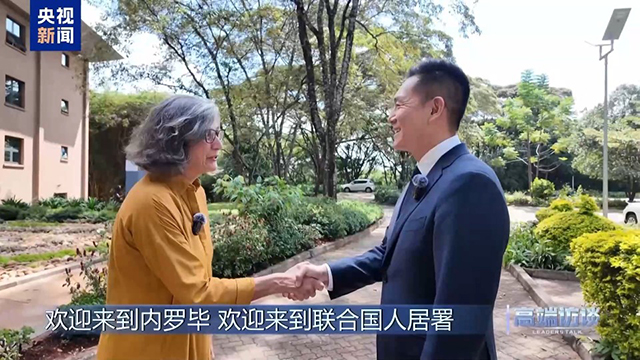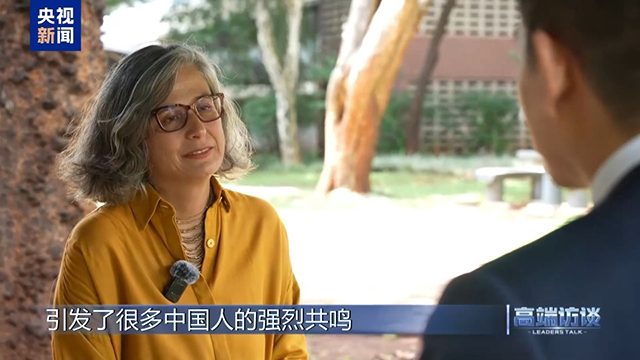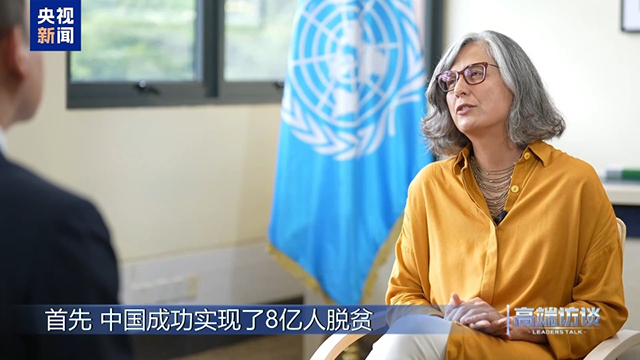


Introduction
Recently, a CCTV reporter conducted an exclusive interview with Anacláudia Marinheiro Centeno Rossbach, the Executive Director of UN-Habitat. Through in-depth dialogue and discussion on topics such as achieving "adequate housing for all," implementing the United Nations' 2030 Sustainable Development Goals, and the implementation pathways, Rossbach acknowledged China's wisdom and efforts in contributing to the improvement of global living standards in areas such as urban governance, ecological and environmental protection, smart cities, and the Global Sustainable Urban Development Award (Shanghai Award).

Anacláudia Marinheiro Centeno Rossbach, UN-Habitat Executive Director
UN-Habitat is headquartered in Nairobi, Kenya, and, along with the United Nations Environment Programme, is one of only two UN agencies headquartered in a country in the Global South. Rossbach said, "I find this arrangement very interesting—placing UN agencies addressing climate issues and urban development problems in the same headquarters-level office."

China's Urban Transformation Receives International Acclaim
Reflecting on her inspection experiences in China, Rossbach emphasized, "China's transformation is truly astonishing!" Taking Beijing as an example, she compared her impressions from inspections in 2012 and last year: The city, once "noisy and smoggy," has transformed into a model of "vitality, cleanliness, and livability." The widespread adoption of electric vehicles, the increase in public green spaces, and the renovation of Olympic legacy sites have left her with a deep impression of scenes where elderly people rest in public spaces and families play with their children.
During her inspection in Shanghai, she highlighted three key aspects: First, the activation and utilization of existing buildings in urban renewal, improving community services and supporting facilities within walking distance by revitalizing existing structures, including spaces for the elderly, community centers, childcare facilities, and medical clinics, vividly demonstrating the "living circle" concept in urban renewal; Second, the 40-kilometer waterfront space along the Huangpu River, where industrial heritage has been transformed to breathe new life into warehouses and factories; Third, the application of "sponge city" technology along the riverbanks, achieving systematic ecological governance from micro to macro levels. She admitted, "The world knows little about China's urban renewal experiences, and we should discuss and promote Chinese experiences more within UN-Habitat."

The Demonstrative Effect of Poverty Alleviation in the Urbanization Process
China's success in lifting 800 million people out of poverty and embarking on the path of urbanization offers valuable lessons for African countries currently undergoing urban transformation. "In the next 25 years, approximately 800 million people in Africa and Latin America will move to cities. Urbanization must simultaneously address housing, education, healthcare, and public space supporting facilities, building urban ecosystems where humans and nature coexist harmoniously," Rossbach emphasized. She stressed that China's large-scale housing construction has not only driven economic growth and created jobs but also provided workers with housing security, and this "people-centric" philosophy "is precisely the essential path for all urban development."

Innovative Practices in Smart City Technologies
In the field of smart cities, Rossbach paid special attention to two innovative practices in China. The first is the intelligent utilization of space: Demonstrative housing meets diverse living needs within limited space through flexible functional area conversion technology; The second is the application of resilience technologies: "Sponge city" technology is being introduced to Brazil for flood prevention through UN-Habitat and is also being explored for application in Nairobi. She added that the recently concluded resumed session of the UN-Habitat Assembly focused on the theme of "smart cities," and the "people-centric" smart city construction guidelines developed at the request of member states are highly consistent with China's urban governance philosophy.Strategic Cooperation Sets a Model for Institutional Collaboration
Rossbach defined the cooperative relationship between China and UN-Habitat as "stable and innovative." Stability is reflected in the fact that China is a member of the UN-Habitat Governing Council and has consistently actively participated in the decision-making process; UN-Habitat has an office in China, and both sides also have in-depth cooperation at the Nairobi headquarters; Cooperation in technical areas such as "sponge cities" has become routine. Innovation is demonstrated by the jointly established Global Sustainable Urban Development Award (Shanghai Award) and the joint revision of the annual "Shanghai Manual" report, which has become the second most downloaded document on the UN-Habitat official website, highlighting its international influence in knowledge sharing.
The Global Sustainable Urban Development Award (Shanghai Award) Leads Global Urban Governance Innovation
The innovation of the "Shanghai Award" lies in its ability to clarify innovative directions and disseminate innovative ideas. Rossbach said, "Nowadays, whether visiting countries, participating in events, or communicating with governments at all levels, people most frequently mention their desire to understand global cutting-edge trends and innovative practices and their desire for capacity building." This award is receiving increasing attention.

The Global Housing Crisis Urgently Requires Collaborative Governance
Currently, approximately 2.8 billion people worldwide face inadequate housing conditions, with over 1.1 billion living in slums or informal settlements and more than 300 million completely homeless. Regionally, 62% of urban housing in Africa is informal; In the Asia-Pacific region, over 500 million people lack access to basic water supply, and the environmental sanitation needs of over 1 billion people are not met. Rossbach said, "Achieving the goal of adequate housing for all requires global collaboration, and the necessity of global solidarity is self-evident." China's experiences in urban governance, ecological and environmental protection, smart cities, and other fields are of great significance for global urban sustainable development and the implementation of the United Nations' 2030 Agenda for Sustainable Development.
In response to the global housing crisis, Rossbach highly recognized the alignment between China's philosophy of "cities built by the people and for the people" and the global document, the New Urban Agenda. She emphasized that urban planning needs to avoid situations where "planning is overly complex and bureaucratic," allowing the public to understand the planning logic while balancing the social and ecological functions of land, and building an ideal urban vision based on public consensus. China's "people-centric" urban philosophy "is precisely the essential path for all urban development."

Edited by Jiangyu Chen with reference to CCTV.com, https://mp.weixin.qq.com/s/QcIPu66Smj5y0ua CbtUV3Q, https://finance.sina.com.cn/wm/2025-07-19/doc-inffzitq9994634.shtml, https://news.qq.com/rain/a/20250719A042IW00